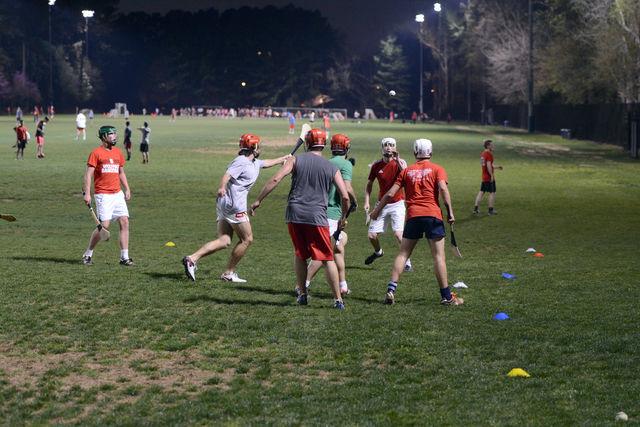Each year on St. Patrick’s Day, many people are eager to learn about and celebrate Irish culture. One organization that dedicates itself to doing just that all year long is the Gaelic Athletic Association at NC State.
Although the organization’s name only highlights “athletics,” it goes beyond just Gaelic sports, according to Steven Shannon, a faculty adviser for the GAA and chairman of South East Division GAA of the North American County Board. The GAA also exposes students to lesser known Irish heritage and culture, as well as creates a community and mentorship opportunities.
Shannon’s interest in Gaelic sports is from 20 years of playing hurling, one of the national sports of Ireland. As an adviser for the GAA at NC State, he reserves fields for tournaments and connects the association with resources it needs.
“I also act as a mentor,” Shannon said. “I foster platforms where students can build leadership qualities or develop professional and social skills.”
When he is not advising the GAA, Shannon, an associate professor in the Department of Nuclear Engineering, also helps graduate students with their research papers and building professional connections.
The history of GAA goes back to the 19th century. On Nov. 1, 1884, a group of Irishmen gathered at a hotel in Thurles, Ireland to plan an amateur sport club to standardize Gaelic sports and create community. Due to the GAA’s goal of creating community, Irish immigrants formed GAA clubs wherever they settled in the United States to build Irish communities. Now, the GAA is an international organization with its clubs existing in countries such as Singapore and Qatar.
“The GAA here is different from back home,” said Michael Delaney, an exchange student from Cork, Ireland. “We have been playing only with Irish [at the University College Cork], but here, we are playing with other international students. We’ve got Spanish, Australians and even British.”
Although the history of the first GAA began in 1884, the GAA at NC State began more than a century later, even though NC State was founded in 1887, according to Shannon.
“The history of GAA at NC State is very short,” Shannon said. “After the GAA club in Raleigh was set up in 2012, we thought that we could expand the GAA to the campus life because there was a strong rivalry between Duke, UNC-Chapel Hill and NC State.”
The GAA at NC State practices two Irish sports, whose histories go back to the prehistoric era. One of the spots in which the organization plays is hurling. Hurling is played on a field about 140–160 yards long where players use wooden sticks called hurleys to hit a small ball called a sliotar, which are about the size of baseball, between opponents’ goalposts. Although players use various tackling moves to stop the opponents, the only protection players wear are hurling helmets.
The second sport the organization plays is Irish football. Irish football is played on a field as big as the one used for hurling. Although Irish football uses tackles similar to American football, it is nothing like American football.
In Irish football, the players can carry the ball for four steps. After the fourth step, they have to either pass the ball or bounce the ball to continue carrying it. To pass the ball, the player has to strike the ball with his or her hand or fist, or kick the ball from hand. The player also can pass the ball by kicking it on the ground like a pass in soccer.
The player has two options to score in Irish football: kick the ball over the crossbar for one point, or kick the ball into the net for three points. As for protective gear, there is none. Players do not wear any padding or helmets — just jerseys, shorts and football boots.
Shannon said the GAA at NC State is currently practicing hard to beat UNC and other universities in hopes of advancing to the national games. However, the NC State team may face an obstacle during the summer season because the Irish exchange students who play will have returned to Ireland by then, according to Shannon.
“It’s a shame to see Irish exchange students go back home in May,” Shannon said. “The GAA national games are held in the summer season, and Irish students have played for the GAA ever since they were little.”
Shannon said this St. Patrick’s Day is particularly unique due to Irish history. One hundred years ago, there was an armed uprising in Ireland during the week of Easter known as the Easter Rising.
“This year’s St. Patrick’s Day is very important,” Shannon said, “It’s the centennial of the Easter Rising. In fact, this year’s GAA championship will be held in the Croke Park, Dublin, Ireland.”
The GAA at NC State also provides students the opportunity to experience Irish heritage beyond sports. The GAA at NC State participates in fundraiser events hosted by the Raleigh GAA, where students can see Irish dance and listen to Irish music concerts. Or, students can attend the GAA field practice and meet Irish exchange students.
For any students who are interested in joining the GAA at NC State, they can attend its regular field practice at Miller Fields. The dates and times can be found on the GAA Facebook page.








